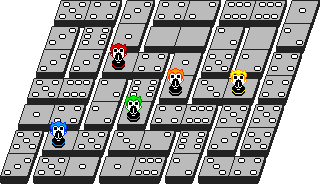An example board set-up. Mephisto is a now nearly-forgotten game, and the full rules are no longer available. A partial version is available on Mindsports, Christian Freeling's web site, and the partial rules are copyrighted by Mindsports. It is played on 28 dominoes drawn randomly and laid out in a 7x8 grid with no orthogonally adjacent blanks (except for double blank dominoes).
Each player places his
token on a blank, then throws a die, which determines how many orthogonal moves they can make on the turn. Once all players have thrown their die, they must figure out how to move so as to get the highest score for the turn. In the original game, the first person to figure out the highest-scoring path for the group of pieces plays it and gets the total score; in a cooperative variant, all players can figure out the path together and points can be given for the group instead of individual players (funnily enough, this variant was actually the result of me misreading the rules). One is not allowed to step on the same square twice on his move, including one's starting square. Score is calculated by adding up the values of the squares each player ends his turn on. The highest scoring value comes from all players ending their turn on the same number (this is called a "street"), although it is not specified how this is scored.
Here is my suggestion for street scoring rules. The rules we have say that five players landing on a 6 gives them the normal scoring of 6+6+6+6+6 (30), but that this is the lowest score for streets. In the spirit of upholding this rule and establishing a simple rule for the other cases, I would recommend adding up street values by substracting them from 12 first. In this way, a street of fives would give 35 points for five players (12-5=7, 7x5=35), a street of four would give 40 points (12-4=8, 8x5=40), and so on. A street of blanks, called a Mephisto, should give twenty points per player (in keeping with its difficulty and status of highest scoring street). A group of five players playing a Mephisto should therefore score a hundred points (20x5).
It's really too bad that this game has not been successful. Despite the strong random element, it is a simple game which requires a lot of cooperation between the players. I can see this as a very good light game which does not take a lot of space (especially if you lay down the dominoes in a little cardboard box of the correct size) and that one can play at any time in a convivial atmosphere.
If you are the maker of this game, or if you have played it and want to submit a review, please email me.
